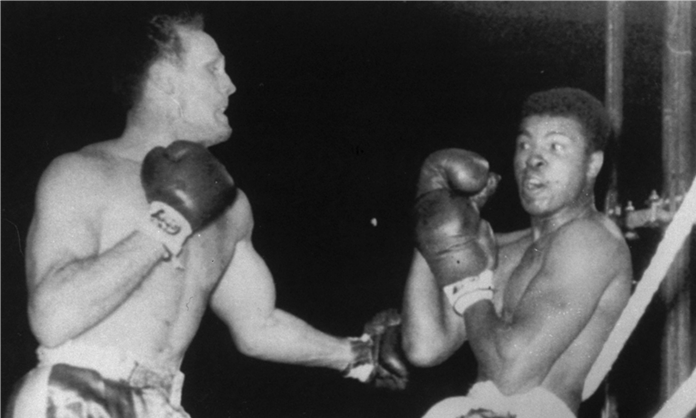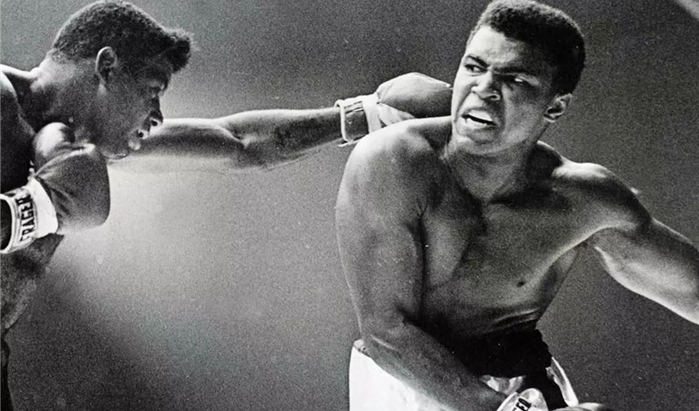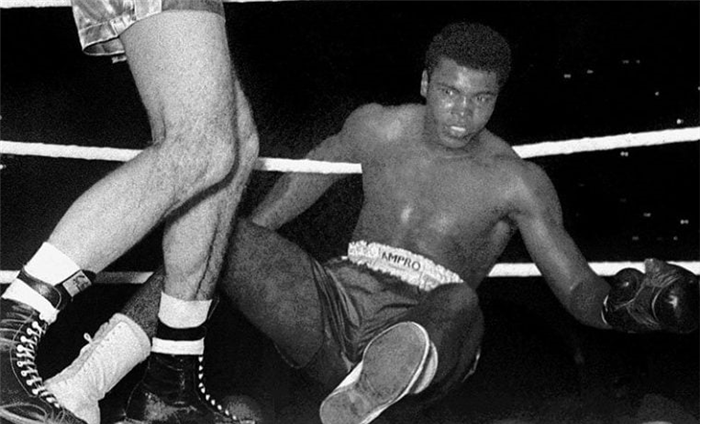A 21-year-old Cassius Clay was completely unaware of the danger. After having had a scare or two in the opening round, as well as a bloody nose, the brash young American had things well in hand in the fourth. His opponent was gushing blood from a horrific eye cut, and a predicted fifth-round stoppage looked assured.
It was June 18, 1963, at Wembley Stadium, when a nonchalant Clay tossed a half-hearted punch over the head of British champ Henry Cooper and left himself open. A sitting duck, he was caught on the counter by the Englishman’s signature shot – the left hook. ‘Enry’s Hammer landed flush with sickening impact just as the bell sounded to end Round 4.

It may be disconcerting for “Smokin’” Joe Frazier fans, but no single punch ever hurt Muhammad Ali more than this one did
“I am now convinced that if that round lasted 20 seconds longer that Cooper would have knocked Clay out,” recalled Hall of Fame boxing journalist Colin Hart, who was tasked with collating quotes for the long-defunct Daily Herald that night. “Nobody finished better than Henry Cooper, and when Ali got up, he didn’t know where the hell he was. The bell sounded and saved him.
“When Clay got back to the corner, [assistant trainer Chickie Ferrara] can be seen putting smelling salts under his nose. You see in the film, Clay jerks his head back away from it, and of course, smelling salts were illegal. (Chief second) Angelo Dundee got away with [having them in the corner.]”
Clay would recover and win as predicted in the fifth round. Or, as Hart recalls, “Clay stopped f***king about and cut Henry to ribbons.” The fight, which was a scheduled 10-round heavyweight title eliminator, was in the record books. But the controversy, the anecdotes, the legend of the Clay-Cooper fight had only just begun.

The reverberations from that punch have carried on for six decades
Advertisement
“Clay arrived, 21 years old, and let’s not make bones about it, he was hated by a lot of people in this country,” admitted Hart. “In that era, the British were not fans of sportsmen being boastful or explaining how good they were. Clay would say things like, ‘If Cooper talks jive, he’ll fall in five,’ and the British took great exception to that. They weren’t used to it.
“The weigh-in was at the London Palladium and when Clay got there, he noticed a crown in the corner of the dressing room that had been used in a pantomime. On the night of the fight, when he came to the ring, he was wearing an ermine robe with that crown on his head. That only added to the crowd’s dislike for him.”

What everyone remembers, however, is that punch. Is it the most famous in British boxing history?
“It is, without question,” said Hart instantly. “It made Cooper a national hero. In this country, as strange as it is, we love losers. The vast majority of people felt that the bell saved Clay from being knocked out and that made Cooper a hero in their lives.
“Cooper was already very popular, but when he scored that knockdown, which millions of viewers saw the next night on television, it changed everything. You need to remember, the next fight Clay had was against Sonny Liston [for the title]. If Cooper had knocked out Clay, it would have changed the course of the heavyweight division, because Clay would not have got the fight with Liston.”
Three years later, Ali, who sensationally halted Liston in six rounds in February 1964, made the fourth defence of his title against Cooper. Again, “The Greatest” prevailed via cut-induced stoppage, this time in the sixth round.
